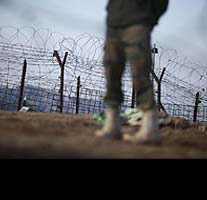 New Delhi, Jan 17: In a major climb-down after facing military as well as diplomatic heat from India, the Pakistani Army on Wednesday shed its earlier confrontationist attitude to declare its troops would now firmly uphold the ceasefire agreement and exercise restraint on the 778-km-long Line of Control (LoC).
New Delhi, Jan 17: In a major climb-down after facing military as well as diplomatic heat from India, the Pakistani Army on Wednesday shed its earlier confrontationist attitude to declare its troops would now firmly uphold the ceasefire agreement and exercise restraint on the 778-km-long Line of Control (LoC).
The Indian Army, while still furious over the beheading of one of its jawans, promptly accepted the truce offer made during the DGMO (director-general of military operations)-level talks to ensure the precarious situation along the LoC did not escalate "beyond the tactical level".
The beginning of the military de-escalation on the ground came even as Pakistani foreign minister Hina Rabbani Khar struck a discordant note at the UN headquarters in New York to charge India with "war-mongering".
With sports, cultural and trade ties already taking a hit, it's clear the bilateral diplomatic chill will continue for some more time to come. A day after PM Manmohan Singh warned Pakistan that it could no longer be "business as usual" in the peace process, senior government officials on Wednesday reiterated Pakistan would have to investigate the barbaric beheading of the Indian soldier if it considered itself a ``civilized country''.
Indian DGMO Lt-General Vinod Bhatia also raised the beheading of Lance-Naik Hemraj by Pakistani Army regulars, in the Mendhar sector of J&K on January 8, with his Pakistani counterpart Major-General Ishfaq Nadeem Ahmed during their talk over the hotline at about 10am on Wednesday.
But while the Pakistani Army remained in denial mode on this matter as before, it did not exhibit the "belligerence" displayed earlier during the DGMO-level talks on January 9 as well as the flag meeting at the Chakkan-Da-Bagh crossing point in Poonch district on January 14.
"The conversation on Wednesday lasted for just about 10 minutes. The Pakistani DGMO said orders had been passed to his troops to strictly observe the ceasefire and exercise restraint. The two DGMOs came to an understanding on not allowing the situation to escalate," said a senior officer. Added another, "Pakistani Army has violated the ceasefire agreement around 15 times since January 1, including four times since Tuesday evening. We were only retaliating to firing from the other side...Let's see for how long the Pakistani Army sticks to its new position."
India had already decided that it would "militarily respond" to Pakistani firing only "tactically" without unnecessarily "upping the ante", in a meeting chaired by the PM on Monday, which was attended among others by the three Service chiefs — Air Chief Marshal N A K Browne, Gen Bikram Singh and Admiral D K Joshi.
Gen Singh had also declared that all his battalion commanders on the LoC would retaliate "aggressively and offensively" but only if the Pakistan Army provoked them by violating the ceasefire or pushing militants into J&K.
Holding that while the beheading had "angered" India at the strategic level, Pakistan's cross-border raid of January 8 was "a tactical operation'' that would be answered "at the tactical level" only, he added.
On Wednesday, once again rejecting Pakistan's charges about Indian troops crossing the LoC, the Army chief said any casualties across the border would have taken place due to the retaliatory firing. "Our jawans don't cross the LoC. We honour human rights. We fire in retaliation when provoked," he said, after meeting the family of Lance-Naik Hemraj at Khairiar village in Uttar Pradesh.





Comments
Add new comment